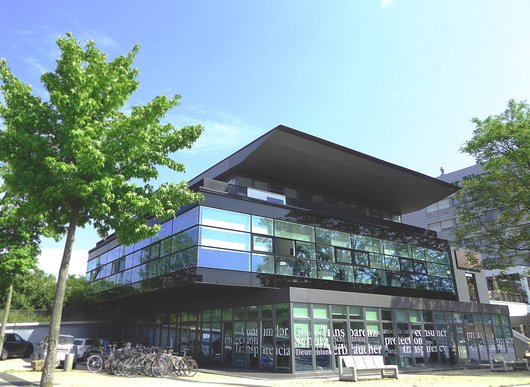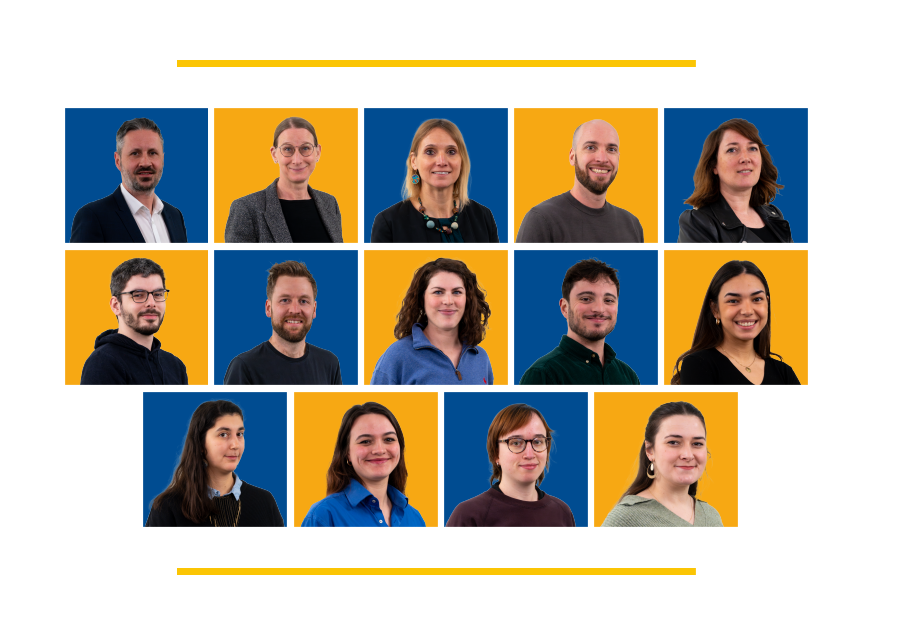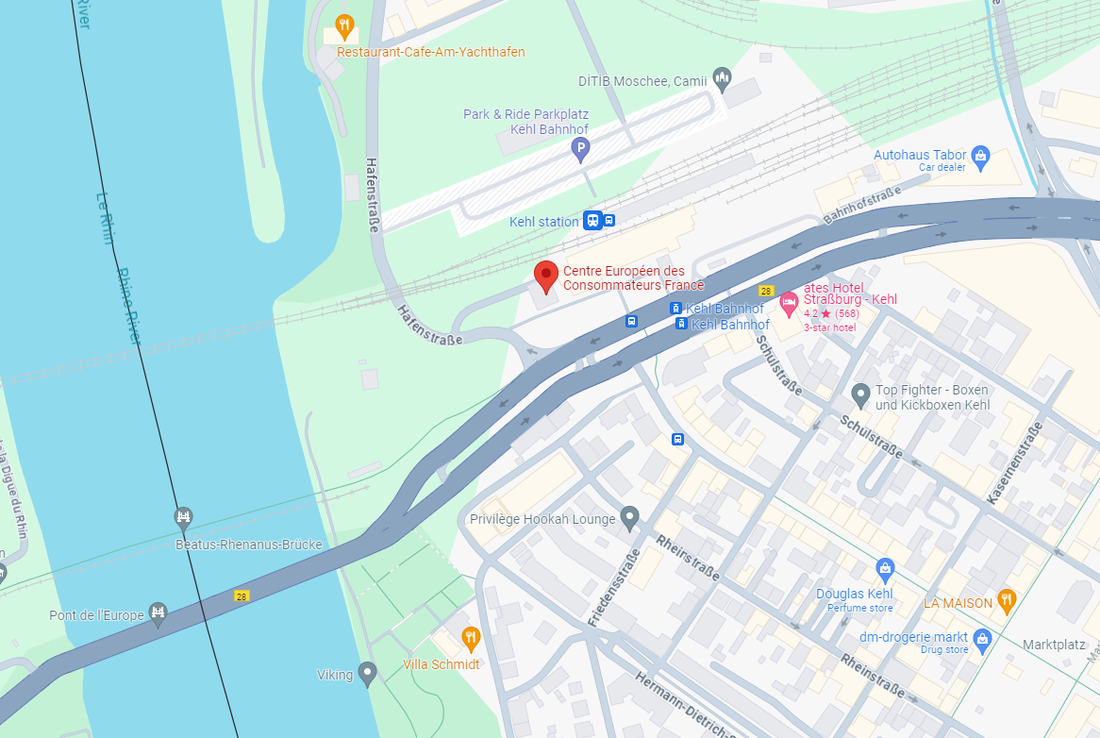Help and advice for consumers
You are a French resident. Your flight got cancelled by the Irish airline, your order placed on a Belgian website was not delivered, a car rental in Spain went wrong… Are you involved in a dispute with a trader based in another EU country than France, in Norway or in Iceland? The European Consumer Centre France helps you free of charge with legal information on your consumer rights in Europe, advice and assistance for an amicable dispute resolution, if you cannot solve the problem on your own.
The European Consumer Centre France
ECC France is a service created in 2005 by the European Commission and co-funded by the French Ministry of Economy and Finance (General Directorate for Competition Policy, Consumer Affairs and Fraud Control). Located in Kehl, Germany, on the border with Strasbourg, ECC France shares the same premises as ECC Germany. Both are hosted by the same French-German association “Centre for Consumer Protection in Europe.”
There is a European Consumer Centre in every country of the European Union, as well as in Norway and Iceland, for a total of 29 ECCs. Here you can find the list of all European Consumer Centres.
While ECC France has no enforcement powers, it can relay recurrent issues to enforcement authorities and national and EU stakeholders. In this regard, as a member of the ECC-Net, ECC France also participates in numerous position papers. These are intended for national and European authorities.
Our main missions: to inform, warn, and protect consumers in Europe
- Informing consumers about their rights in Europe.
- Providing them with free legal advice and assistance in cross-border disputes with a trader based in another EU country, Iceland or Norway.
- Promoting fast and amicable dispute resolution, in cooperation with Alternative Dispute Resolution (ADR) bodies
- Protecting the collective interest of consumers by cooperating with market surveillance authorities
When should you contact ECC France?
The ECC France can help you if you meet these three to four conditions:
- You are a consumer.
- You live in France.
- You have a question about your rights in Europe or a dispute with a trader based in another EU country, Iceland, or Norway.
- You have already contacted the trader more than 14 days ago and no solution could be found.
In this case, you can contact the legal department of ECC France. Please submit your request via our online form.
The ECC France cannot assist you if:
- You reside in a country other than France. In this case, please contact the European Consumer Centre in your country of residence.
- Your questions do not concern consumer law.
- Your dispute is with a private individual.
- Your dispute is with a professional whose registered office is located in France.
- Your question relates solely to French law.
- You have made a purchase from companies located outside the EU (e.g. Asia, United States, etc.). As a reminder, Switzerland is not part of the EU, so we cannot intervene in a dispute between you and a professional based in Switzerland.
- You are a professional.
- You have already entrusted your case to a solicitor, another organisation or a court.
- You have initiated legal proceedings. The ECC cannot represent consumers in court.
- You are claiming damages or compensation for moral or physical harm. That requires an assessment of the harm and its possible long-term effects and thus the involvement of experts or judges.
- You believe you are a victim of unfair, aggressive/abusive or misleading commercial practices and wish to report the trader to the authorities. Report the facts to the French enforcement authority via Signalconso.These practices are covered by Articles L 121-1 et seq. of the French Consumer Code.
How does the network of European Consumer Centres work?
Once your request has been submitted, a legal adviser will analyse your question or dispute. They will check if your claim falls within our area of expertise. If so, they will forward your file to the ECC in the country where the trader is located. A legal adviser from that ECC will contact the trader, reminding them of your rights and their obligations. They will try to reach an amicable solution to resolve the dispute. Throughout these exchanges, ECC France’s legal adviser will keep you informed of the progress of the case. They will be your main point of contact.
Regardless of the outcome of your claim, our legal assistance is 100% free of charge.
ECC France: a team committed to consumer protection
Christian Tiriou, Executive Director | Bianca Schulz, Director ECC France | Elphège Tignel, Communication manager | Romain Boguet, Legal Adviser | Camille Bertrand, Legal Adviser | Raphaël Lacroix, Legal Adviser | Ralph Roggenbuck, Legal Adviser | Coline Port, Legal Adviser | Maxime Lager, Legal Adviser | Mariyam Chender, Social media manager | Eléna Bajrić, Press & Communication officer | Marie Tixier-Habar, Legal Adviser | Judith Lapière, Legal Adviser | Juliette Dubost, Legal Adviser
A key player in boosting confidence in the European market
What our consumers say:
« Thank you very much for your help and efficiency. It is a pleasure to have a European service that defends European citizens. »
« I've just checked my bank account and the airline has paid us the sum of 486.40 euros! After 2 years of complaints, registered letters and appeals to the Conciliator, your organisation has managed to obtain a refund. »
Our European partner networks
The European CPC network enables national authorities to cooperate in combating cross-border infringements by traders and protecting consumers in Europe. ECC France signed a cooperation protocol with the French CPC Single Liaison Office (DGCCRF) in 2010. The protocol was updated in 2025, to optimise the transfer of information and the handling of cross-border complaints.
The European Judicial Network facilitates the resolution of cross-border civil and commercial disputes. It provides European citizens with practical information on their rights.
The European FIN-NET helps consumers resolve their financial disputes with banks, insurance companies or other financial service providers established in another country of the European Economic Area.
The Enterprise Europe Network supports SMEs in their development on the European market. It helps them understand EU regulations, innovate and find partners.
The SOLVIT network provides free assistance to citizens and businesses in resolving problems when a public authority in another EU country does not comply with European legislation.
The Europe Direct network provides citizens with free information on the European Union, their rights, its policies and other information. The network spreads through nearly 500 local centres across the EU.
Safety Gate is a European rapid alert system on non-food products that pose significant risks to health and safety. If you live in France, you can also report a product here.
By phone
Tel.: 0820 200 999 (0,12 euros/min if you are living in France and contacting us via a French operator).

Visit us at our premises
Our team of legal advisers welcomes you on site during the following opening hours: Tuesday to Thursday, from 9:00 a.m. to 12:00 p.m. and from 1:00 p.m. to 5:00 p.m.
An appointment is recommended.
Practical information for accessing our premises:
From Strasbourg, head towards Germany/Offenburg. Take the A4 (Paris-Strasbourg) towards Offenburg. Just after the ‘Europe bridge’, at the entrance to Kehl on your left, you will find our premises on the station square. Parking spaces are available nearby.
From Strasbourg train station, take the Strasbourg-Offenburg train, platform 25, to the ‘Kehl’ stop (2nd stop). Our offices are located on the station square, on the right as you exit the Kehl train station.
Strasbourg/Entzheim Airport: regular shuttle train to Strasbourg station.
From Strasbourg, take the tramway's line D towards ‘Kehl Rathaus’ and get off at the ‘Kehl Bahnhof’ stop.
On social media
To keep in touch with ECC France, follow us on LinkedIn, Instagram or Facebook! And subscribe to our newsletter (in French) to keep up to date with your consumer rights in Europe!
Funded by the European Union. Views and opinions expressed are however those of the author(s) only and do not necessarily reflect those of the European Union or the European Innovation Council and Small and Medium-sized Enterprises Executive Agency (EISMEA). Neither the European Union nor the granting authority can be held responsible for them.





